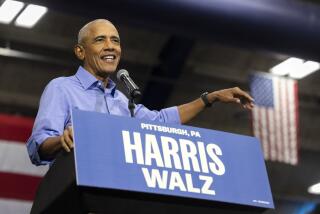Trying out a new message
- Share via
RALEIGH, N.C — . -- With Americans stressed by $4-per-gallon gasoline and a housing slump, presumptive Democratic presidential nominee Barack Obama launched a two-week tour Monday to focus on pocketbook issues.
Along the way, the Illinois senator will try to tie likely Republican nominee Sen. John McCain of Arizona to the policies of an unpopular president.
“For all his talk about independence, the centerpiece of John McCain’s economic plan amounts to a full-throated endorsement of George Bush’s policies,” Obama told an invitation-only audience of 900 at the North Carolina State Fairgrounds.
Obama’s new emphasis follows weeks of focus by McCain on national security and foreign policy, areas where the GOP thinks Obama is vulnerable.
Obama’s “Change That Works for You” tour is his first major campaign swing since he wrapped up the Democratic nomination last week.
The Republican National Committee countered by calling it the “Change We Can’t Afford” tour and pointed to Obama’s support for increases in income, Social Security and capital gains taxes for higher-income Americans.
McCain, in an interview with “NBC Nightly News,” called Obama a spender who had “no way to pay for his programs.”
In Raleigh, with former White House hopeful John Edwards and his wife, Elizabeth, in attendance, Obama said the Bush administration’s tax cuts had hurt the nation.
“For eight long years, our president sacrificed investments in healthcare and education and energy and infrastructure on the altar of tax breaks for big corporations and wealthy CEOs -- trillions of dollars in giveaways that proved neither compassionate nor conservative,” he said.
During his discussion on healthcare reform, Obama extended an arm toward Elizabeth Edwards, a Center for American Progress fellow working on healthcare issues. Edwards is battling recurrent breast cancer.
“I’m going to be partnering up with Elizabeth Edwards,” he said. “We’re going to be figuring all this out.”
Although the electoral map has been relatively stable in the last two presidential elections, Obama’s campaign thinks it can compete in more states, including North Carolina.
Obama is expected to meet with voters and visit workplaces from hospitals to factories in traditional battleground states, including stops Wednesday and Thursday in Iowa and Wisconsin.
Obama’s deputy campaign manager, Steve Hildebrand, said in a fundraising solicitation Monday that the campaign would “deploy and maintain staff in every single state.” By moving into previously dependable Republican states, Obama hopes to force McCain to spend precious resources defending turf, draining him of money for more traditional battlegrounds like Ohio.
By starting the economic tour in North Carolina, Obama’s campaign signaled its interest in trying to win a state that has not voted for a Democratic presidential candidate since Jimmy Carter in 1976. Obama’s aides think the state’s sizable African American and growing non-native white population could turn the state from red to blue.
Obama emphasized his differences with McCain, including his willingness to raise taxes on the wealthy while cutting taxes for others. He called for greater investment in education and alternative energy.
McCain visited Richmond, Va., but spent his day fundraising, pulling in more than $2 million for his campaign and the Republican National Committee Victory Fund.
In a conference call with reporters, Sen. Richard M. Burr (R-N.C.) responded to Obama’s economic proposals. “I think the speech we heard today is what the American people are sick and tired of,” he said. “And that’s blaming somebody else and proposing a set of initiatives that . . . you can’t pay for.”
Obama’s campaign said it was prepared to defend against Republican charges that he is a tax-and-spend liberal.
“He’s going to cut taxes for 95% of workers and their families,” Austan Goolsbee, a University of Chicago economist advising Obama, said in a conference call with reporters.
Obama ended the day in Missouri, which last voted for a Democrat in 1996.
--
Times staff writer Maeve Reston in Los Angeles contributed to this report.
More to Read
Sign up for Essential California
The most important California stories and recommendations in your inbox every morning.
You may occasionally receive promotional content from the Los Angeles Times.













